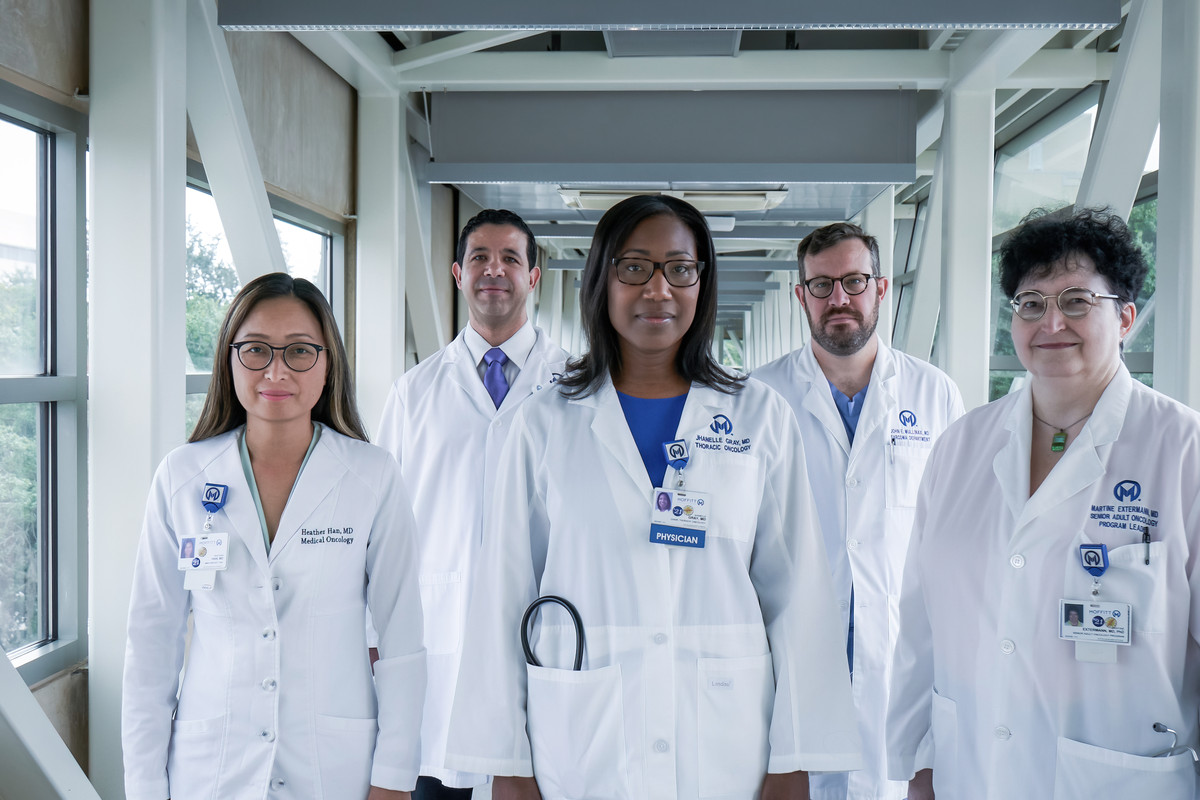Appendiceal Cancer Surgery
Appendiceal cancer originates in the appendix, a small organ attached to the large intestine. In certain animals, the appendix plays a role in the digestive process, but in humans its exact function is unknown. Likewise, the cause of appendiceal cancer is unclear, although genetic mutations and certain risk factors, such as a history of mucinous tumors, may contribute to its development.
Symptoms of appendiceal cancer can vary but may include abdominal pain, bloating or changes in bowel habits. In some cases, the tumor does not produce noticeable symptoms until it progresses. For this reason, appendiceal cancer is often discovered incidentally through imaging tests or surgery performed for an unrelated reason.
Because appendiceal cancer tends to grow slowly, surgical treatment can be highly effective. The goal is to remove the tumor and any affected tissues to help prevent cancer spread. In many cases, no further treatment is needed.


Florida's Top Choice for Cancer Care
Schedule an AppointmentSurgical treatment options for appendiceal cancer may include:
Appendectomy surgery for appendiceal cancer
Often performed as an urgent or emergency treatment for an inflamed or infected appendix (appendicitis), appendectomy involves removing the appendix. This procedure may also be considered for treating early-stage appendiceal cancer, particularly if the tumor is small and confined to the appendix. In many cases, the surgery can be performed laparoscopically using minimally invasive techniques, which can minimize any postoperative discomfort and lead to a quick recovery.
How to prepare for appendectomy surgery for appendiceal cancer
Preparing for an appendectomy typically involves several steps to ensure a safe and effective procedure and smooth recovery. The patient may undergo preoperative testing, such as blood work and imaging studies, which can help the surgeon assess the patient’s overall health and fitness for surgery. To reduce the risk of surgical complications, the patient may need to temporarily stop taking certain medications, such as blood thinners, and fast for several hours beforehand.
What to expect after appendectomy surgery for appendiceal cancer
The recovery period that follows an appendectomy can vary based on the surgical approach. Compared to traditional open surgery, laparoscopic surgery generally results in less discomfort and a quicker return to daily activities. Common postoperative symptoms include mild abdominal pain, fatigue and temporary changes in bowel habits. The patient will likely need to attend follow-up appointments so the healthcare team can monitor their healing and determine if additional treatment, such as chemotherapy, is necessary. Full recovery can take several weeks, and adherence to the surgeon’s post-surgical care instructions is essential to ensure optimal healing.
What are the risks and potential complications of appendectomy surgery for appendiceal cancer?
The risks of appendectomy include infection, excessive bleeding and adverse reactions to anesthesia. Though rare, other possible complications include damage to surrounding tissues, blood clots and hernia development at the incision site. Careful preoperative planning and postoperative monitoring can help minimize these risks.
Hemicolectomy surgery for appendiceal cancer
Hemicolectomy may be considered to address an advanced appendiceal tumor that has spread beyond the appendix. The procedure involves removing the appendix, an adjacent portion of the large intestine and possibly some nearby blood vessels and lymph nodes to check for further cancer spread. Depending on the extent of the tumor, the patient’s overall health and other factors, the surgery may be performed with open or minimally invasive techniques.
How to prepare for hemicolectomy surgery for appendiceal cancer
Preparing for a hemicolectomy involves several key steps. The surgeon may advise the patient to undergo preoperative testing, such as blood work, imaging and a colonoscopy, to evaluate the extent of the cancer and the patient’s overall health. Bowel preparation, including a liquid diet and laxatives, is often required to clear the colon before surgery. The patient may also need to temporarily adjust or pause certain medications, such as blood thinners. These preparations can reduce surgical risks and support a smooth recovery.
What to expect after hemicolectomy surgery for appendiceal cancer
After a hemicolectomy, the patient can expect a hospital stay of several days so the healthcare team can oversee their initial recovery and help them manage any discomfort. Common postoperative effects include abdominal pain, temporary changes in bowel habits and fatigue. After starting with liquids and progressing to soft foods, the patient may gradually return to a normal diet. Full recovery can take several weeks, and follow-up appointments will be essential to monitor progress and discuss additional treatment, such as chemotherapy if needed. Adherence to the surgeon’s postoperative care instructions can help ensure the best possible outcome.
What are the risks and potential complications of hemicolectomy surgery for appendiceal cancer?
Hemicolectomy carries general surgical risks, such as infection, excessive bleeding and adverse reactions to anesthesia. It also carries specific risks, including damage to a nearby organ, such as the small intestine or bladder, and leakage at the site where the colon is reconnected (anastomotic leak). Other possible complications involve blood clotting, bowel obstruction and prolonged changes in bowel function. While rare, a hernia may develop at the incision site. Delayed wound healing can also occur. Careful surgical techniques and thorough postoperative monitoring can help minimize these risks.

Hyperthermic intraperitoneal chemotherapy (HIPEC) for appendiceal cancer
HIPEC may be a treatment option for appendiceal cancer that has spread to the peritoneum, a sheet of smooth tissue that lines the abdominal cavity and surrounds the abdominal organs. Typically administered immediately after all visible cancer cells have been surgically removed, HIPEC involves the infusion of heated chemotherapy medications directly into the abdominal cavity. The goal is to target and destroy any remaining cancer cells, including those that are too small to be seen or surgically removed.
Compared to traditional chemotherapy drugs, heated chemo drugs can penetrate tissues more deeply, allowing them to reach and destroy more cancer cells. Additionally, unlike chemotherapy drugs that are administered intravenously, HIPEC drugs do not circulate throughout the body. Therefore, they can be used in higher doses for enhanced effectiveness.
How to prepare for hyperthermic intraperitoneal chemotherapy for appendiceal cancer
Preparing for HIPEC involves several steps to help ensure a safe and effective procedure. The patient will typically undergo preoperative testing, including blood work, imaging and possibly a biopsy, to assess their overall health and the extent of the tumor. The patient may be instructed to pause certain medications, such as blood thinners, and to prepare their bowel by fasting or using laxatives. Following the surgeon’s preoperative instructions can minimize surgical risks and support a smooth recovery.
What to expect after hyperthermic intraperitoneal chemotherapy for appendiceal cancer
After HIPEC, the patient will remain in the hospital for several days for monitoring and pain management. Common postoperative symptoms include abdominal discomfort, fatigue, nausea and temporary changes in bowel habits. The patient may also have drainage tubes in place to remove excess fluid from the abdominal cavity. Recovery time can vary, but full healing generally takes several weeks. Follow-up care will be essential to monitor progress and address any complications or further treatment needs.
What are the risks and potential complications of hyperthermic intraperitoneal chemotherapy for appendiceal cancer?
The risks of HIPEC include those associated with the surgical procedure, such as infection, bleeding and damage to surrounding organs. Specific risks of HIPEC include inflammation, damage to the abdominal lining, fluid imbalances and impaired kidney function. Other possible complications include nausea, fatigue and delayed wound healing. The combination of extensive surgery and HIPEC can also increase the risk of blood clots as well as prolong recovery time. Close monitoring and supportive care during and after the procedure can help minimize these risks.
#1 Cancer Hospital in Florida
Moffitt is the top-ranked cancer hospital in Florida and the Southeast and ranked No. 15 in the nation in Newsweek’s “America’s Best Cancer Hospitals."
Debulking (cytoreductive) surgery for appendiceal cancer
Debulking surgery may be considered to address an appendiceal tumor that has spread within the abdomen, possibly to the peritoneum. Rather than completely removing the tumor, the goal is to reduce the cancer burden and improve the effectiveness of other treatments, such as chemotherapy. Cytoreductive surgery is often combined with HIPEC to target any remaining cancer cells in the abdominal cavity. While the procedure is complex, it can improve the patient’s outcome and quality of life.
How to prepare for debulking surgery for appendiceal cancer
Preparing for cytoreductive surgery typically involves several steps to ensure a successful procedure. The patient will undergo several preoperative assessments, including blood testing, imaging studies and a physical examination to evaluate the extent of the cancer and their overall health. Bowel preparation may be required, such as fasting or using laxatives to clear the intestines. The patient should also review their current medication regimen with their surgeon, as some adjustments may be required. By carefully following the surgeon’s instructions, the patient can minimize surgical risks and promote an optimal recovery.
What to expect after debulking surgery for appendiceal cancer
After cytoreductive surgery, the patient can expect a hospital stay of several days to allow the healthcare team to monitor their recovery, manage any discomfort and help prevent complications. Common postoperative symptoms include abdominal pain, bloating and fatigue. If HIPEC is performed alongside the debulking surgery, the patient may experience additional side effects, such as nausea. Recovery time can be longer compared to less extensive appendiceal surgery, and the patient will likely need to gradually return to normal activities. Follow-up care, which may include additional treatment such as chemotherapy, is essential for monitoring progress and managing any remaining cancer cells.
What are the risks and potential complications of debulking surgery for appendiceal cancer?
Due to the complexity of the procedure and the extent of the cancer being addressed, cytoreductive surgery carries certain risks and potential complications. These include infection, excessive bleeding and adverse reactions to anesthesia, as well as damage to surrounding organs, such as the intestines, liver and bladder. Other possible complications include bowel obstruction, delayed wound healing, blood clots and anastomotic leaks if portions of the bowel were reconnected. If HIPEC is performed, additional risks include infection from the heated chemotherapy and damage to healthy tissues. Careful surgical techniques and close postoperative monitoring are crucial to minimizing these risks.
Peritonectomy surgery for appendiceal cancer
Peritonectomy surgery involves removing the parts of the peritoneum affected by cancer. This procedure is typically performed in conjunction with debulking surgery to eliminate all visible cancer cells, particularly in cases where the tumor has spread extensively within the peritoneal cavity. Peritonectomy is often combined with HIPEC to target any remaining microscopic cancer cells, aiming to improve the outcome and reduce the risk of recurrence. This complex surgery requires careful planning and is usually performed by a highly specialized surgical team.
How to prepare for peritonectomy surgery for appendiceal cancer
Preparing for peritonectomy surgery involves comprehensive preoperative planning. The patient may need to undergo imaging studies, blood tests and other evaluations to assess their overall health and the extent of cancer. Bowel preparation, which may involve fasting or laxatives, is often required to clear the intestines before surgery. Additionally, certain medications, such as blood thinners, may need to be temporarily adjusted or paused. Following the surgeon’s preparation instructions can help reduce surgical risks and ensure the best possible outcome.
What to expect after peritonectomy surgery for appendiceal cancer
After peritonectomy surgery, the patient can expect a hospital stay ranging from several days to several weeks depending on the complexity of the procedure and their recovery progress. Common postoperative symptoms include abdominal pain, fatigue and temporary bowel dysfunction. The patient may have drainage tubes in place to remove excess fluid, and they will be closely monitored for complications, such as infection and blood clots. Compared to less extensive appendiceal cancer surgeries, recovery time is generally longer. Follow-up care and further treatment, such as chemotherapy, may be necessary to address any remaining cancer cells and help prevent recurrence.
What are the risks and potential complications of peritonectomy surgery for appendiceal cancer?
Peritonectomy surgery carries several risks and potential complications due to its complexity. These include infection, excessive bleeding and adverse reactions to anesthesia. Specific surgical risks involve damage to nearby organs, such as the intestines, bladder or liver, and scar tissue formation. Other possible complications include bowel obstruction, delayed wound healing and blood clots. In some cases, fluid imbalances or nutritional deficiencies can occur due to the removal of peritoneal tissue. Close monitoring and adherence to the surgeon’s postoperative care instructions are essential to minimize these risks and support recovery.
Benefit from world-class care at Moffitt Cancer Center
The multispecialty team in Moffitt’s renowned Gastrointestinal Oncology Program offers the latest treatment options for appendiceal cancer, including complex surgical procedures such as HIPEC and peritonectomy. Additionally, through ongoing studies, our outstanding research team is continually developing, refining and evaluating the effectiveness of novel surgical approaches. Our goal is to make the benefits of our landmark discoveries available to our patients as quickly as possible. To do so, we have established a robust clinical trials program that provides our patients with unique opportunities to be among the first to benefit from promising new options that are not yet available elsewhere. As a National Cancer Institute-designated Comprehensive Cancer Center, Moffitt is widely recognized for advancing the treatment of appendiceal cancer and other gastrointestinal tumors.
If you would like to learn more about appendiceal cancer surgery, you can request an appointment with a specialist in the Gastrointestinal Oncology Program at Moffitt by calling 1-888-663-3488 or submitting a new patient registration form online. We do not require referrals.

